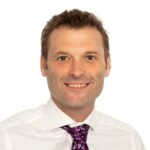Graham P. Martin, Robert Pralat, Justin Waring, M. Farhad Peerally, New forms of expertise and their implications for the system of professions in healthcare: the case of the patient safety specialist role in the English NHS, Social Science & Medicine, Volume 385, 2025,118562, ISSN 0277-9536, https://doi.org/10.1016/j.socscimed.2025.118562
New forms of expertise and what they mean for healthcare professions – the case of the patient safety specialist role in the English NHS
Why it matters
Researchers have long studied how professions become established and work together in healthcare and other settings. A major question is how new groups become recognised as professions, how they interact with other professional groups, and what this means for the organisation of healthcare. Traditionally, academics have seen professional groups as competing with one another, with each profession trying to control its own work and pass on work it doesn’t want to other groups. More recent research has started to challenge this view.
The patient safety specialist role was introduced in 2020, and since then, patient safety specialists have been appointed in every NHS organisation in England that commissions and provides healthcare. Patient safety specialists provide leadership, oversight and expertise relating to patient safety. They combine their healthcare knowledge with theory and evidence from other sectors outside healthcare to help manage different types of safety risk. Some have suggested that the role could develop into a profession in its own right. But it’s not clear what it would take for this to happen, or what it would mean for existing professional groups like doctors and nurses.
We studied the experiences of newly appointed patient safety specialists in the NHS to look at whether – and how – they tried to claim professional status, what form their claims took, and how successful they were.
What we found
Many people felt that the specialised knowledge held by patient safety specialists could provide a firm foundation for a claim to professional status. For example, many specialists had built expertise in sophisticated new approaches to monitoring and reducing risks to patients. But in practice, patient safety specialists often found themselves pulled towards activities that did not draw on this expertise, such as checking that existing processes were being followed correctly.
Nevertheless, patient safety specialists found that some of their colleagues were more receptive to their expertise. Working closely with clinical colleagues, they identified ways in which new approaches could bring benefits to clinical services.
Our findings suggest that it is through cooperation with other groups that patient safety specialists are best able to establish the importance of their expertise and make a valuable contribution to patient safety.
However, this mutual reliance on other groups may mean that it is more difficult for patient safety specialists to become established as a profession in their own right – at least in the traditional sense. Nevertheless, by complementing, rather than competing with, established professional groups, they can still carve out a distinctive and important role in ensuring safe, high-quality healthcare.



